Panel: UW to focus on founders in entrepreneurship push
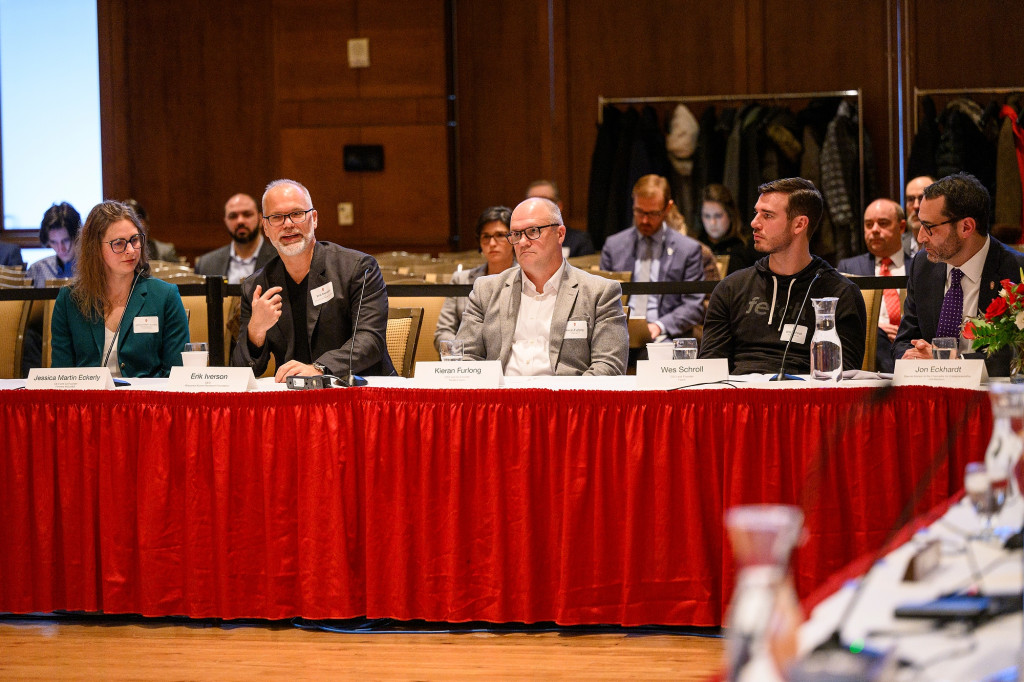
Erik Iverson, CEO of the Wisconsin Alumni Research Foundation, speaks during a panel presentation titled “Empowering Innovation and Entrepreneurial Excellence” on Feb. 7. From left to right are Jessica Martin Eckerly, Iverson, Kieran Furlong, Wes Schroll and Jon Eckhardt. Photo: Althea Dotzour
At the Universities of Wisconsin Board of Regents meeting on Friday, Feb. 7, a panel of entrepreneurs, university leaders and business experts made a case for why founders – the individuals who create and build companies — must be the focus of UW–Madison’s evolving approach to entrepreneurship.
The discussion, led by Professor Jon Eckhardt, special advisor to the chancellor for entrepreneurship, outlined a new vision for how UW–Madison can better support students, faculty, and alumni in launching businesses — and why that shift is critical for Wisconsin’s economy.
“We need to lean into entrepreneurship so our faculty, students, alumni and state can learn to leverage technologies and shape the future economy of the state and the world instead of being shaped by it,” said Eckhardt.
Eckhardt is leading the Wisconsin Entrepreneurship Initiative, which draws on the findings and recommendations of a study commissioned by Chancellor Jennifer L. Mnookin last year.
“The goal is to make UW–Madison a premier institution for people who want to pursue entrepreneurship,” said Mnookin during her remarks to the Universities of Wisconsin Board of Regents on Thursday, February 6. “This is another area where we have opportunities to magnify our already tremendous economic impact on Wisconsin and move life-changing innovations out into the world.”
Focus on founders
Eckhardt, who co-chaired UW–Madison’s entrepreneurship study committee with Chris Kozina, then assistant vice chancellor for industry engagement, now leads the Wisconsin Entrepreneurship Initiative. The university’s multifaceted entrepreneurship plan includes establishing leadership and structure, creating a culture that celebrates and promotes entrepreneurship, expanding access to capital, and committing to excellence in entrepreneurship with a focus on founders.
“Our strategy is to shift and focus on founders — the people who create and build companies,” said Eckhardt. “We want to recruit them into the state of Wisconsin, and from across our state, to help them develop as entrepreneurs and develop their ideas into companies while they’re here.”
Wes Schroll, CEO and co-founder of Fetch, a rewards app valued at more than $1 billion, is one such founder. A recipient of the Chancellor’s Entrepreneurial Achievement Award in 2023, Schroll joined the panel to share his experience starting his business while attending UW–Madison as a student. A native of Boston, he pursued his undergraduate degree at UW–Madison because of its resources in entrepreneurship. He noted the support and opportunity he was able to access, and how his experience gave him the resources and confidence he needed to start his business.
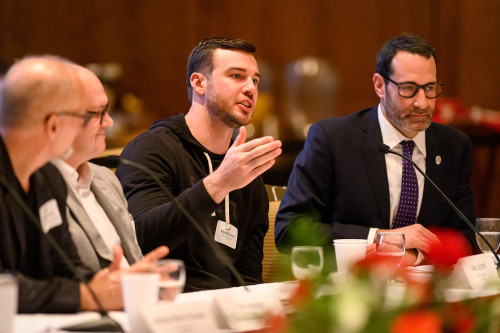
Wes Schroll, CEO and founder of Fetch, addresses Wisconsin’s entrepreneurship push. Photo: Althea Dotzour
Schroll believes the university’s commitment to ensuring entrepreneurs have a positive experience — making his own the expectation rather than the exception — will have a significant impact.
“I think the state will benefit; I think the university will benefit; and hopefully the companies that are created here will benefit millions of others,” said Schroll.
Eckhardt said Schroll’s story is a great example of the potential effectiveness of the new founder-focused “Recruit, Develop, and Launch” strategy for campus entrepreneurship.
Complimenting existing strengths
The Entrepreneurship Initiative also seeks to understand and uplift strengths that already exist.
“The philosophy here is really that we want to lean into one of our core capabilities of the university, which is we attract people from all over the world and incredible talent from across Wisconsin,” noted Eckhardt.
Jessica Martin Eckerly, CEO and co-founder of Forward BIOLABS, a Midwest co-working life science lab for early-stage startup companies, noted that one of the concepts highlighted in UW–Madison’s entrepreneurship report was expanding programming around entrepreneurship for students, building on UW–Madison’s strengths in education and talent.
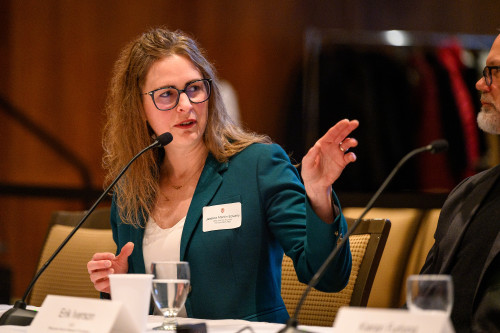
Jessica Martin Eckerly, CEO and co-founder of Forward BIOLABS, speaks during the panel presentation. Photo: Althea Dotzour
“How many more students do we have born in Wisconsin that if we expose them more to business concepts, to the vernacular around term sheets and raising capital, how many more would take the step into entrepreneurship?” she mused.
Another strength UW–Madison plans to build on is the relationship between the university and the Wisconsin Alumni Research Foundation, as well as using the existing tools the partnership makes available to innovators and researchers on campus.
Kieran Furlong, CEO and co-founder of Realta Fusion, an early-stage company developing fusion energy for applications in industrial process heat and power, pointed to his own company as an example of the strengths that the university and WARF bring to entrepreneurs.
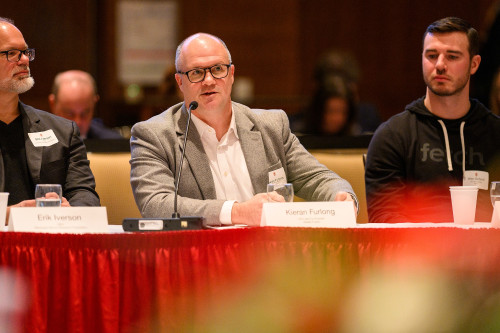
Kieran Furlong, CEO and co-founder of Realta Fusion, speaks during the panel. Photo: Althea Dotzour
“It’s no exaggeration to say that without the University of Wisconsin–Madison, and without WARF, Realta Fusion would not exist,” said Furlong. “The jobs we’re creating would not exist, and the millions of dollars that we’re bringing to the state and to the university as an investment would not exist either.”
Erik Iverson, CEO of WARF, said WARF receives about 400 new inventions from across campus annually. He emphasized WARF’s role in supporting and cultivating technology transfer, noting that while entrepreneurship is complimentary to WARF’s role, it is not their focus.
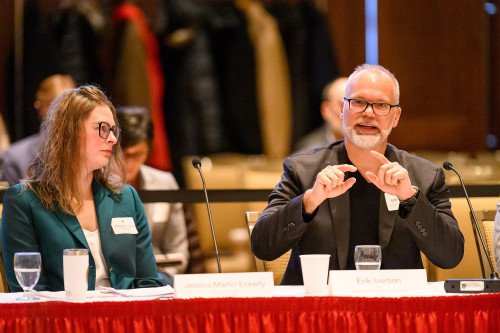
Erik Iverson, CEO of the Wisconsin Alumni Research Foundation, speaks during the panel. Photo: Althea Dotzour
“(The founder-based approach) is very supportive and synergistic of the technology transfer process, because one of the things that we need in order to bring more science out of our university into companies, is enterprising individuals who are trained to take risks,” explained Eckhardt.
What’s next for entrepreneurship
“I think it’s a moment,” said Schroll, an opportunity to lift Wisconsin’s entrepreneurial profile to attract capital from other areas of the country. Schroll called on the university and state to grow the culture and attract more entrepreneurs — and potentially more capital— by celebrating and calling out success and moving forward with a founder-focused approach to entrepreneurship.
Eckerly noted that entrepreneurs who get their start in the state often stay here.
“What happens is those investments allow our companies to hire people — they hire students in Wisconsin,” said Eckerly. “They build their companies in Wisconsin.”
Eckerly, who grew up in a rural area of Wisconsin and has committed her career to advancing entrepreneurship in the state, expressed optimism and excitement about UW–Madison’s efforts and in the broader entrepreneurial landscape of Wisconsin.
“I want to see this happen for Wisconsin,” said Eckerly. “We can do this, and there’s so much more that we can do. I’m really excited for the future entrepreneurship in Wisconsin.”




